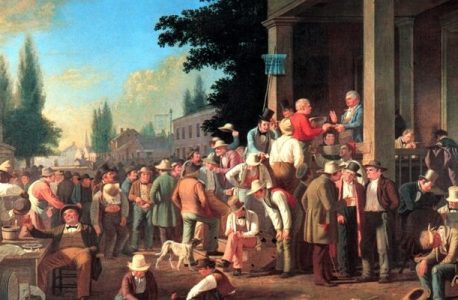By Mr Aldrich for Identity Dixie
The problem with modern politics is that anyone can vote for a politician as long as they are in a geographic location and breathing. Sometimes, not even the breathing part is important. Just because anyone can do it doesn’t necessarily mean that everyone should. Just because I live in the vicinity of a company does not mean that I get to vote in the company’s decisions. There are public companies that I own stock in, a very small amount of stock, but I get to vote because I own a portion of that business. I am not allowed to vote for the local mayoral candidate because I do not live within the town limits, even though this town is where I spend much of my money. I’m not upset about not being able to vote in this town because I don’t want to follow the rules of living in the town. I definitely have no desire to change the rules of anyone living in the town because those rules do not impact me.
The way I considering voting in a Free Dixie is definitely exclusionary, at least by modern standards. The key factors for voting should be land ownership or business ownership. These two things used to be synonymous, but not anymore. Business ownership must have a defined home address and that determines the area you are allowed to vote, not that one individual can vote in multiple areas or territories because their business expands into those areas. I understand the argument that some companies are LLCs or corporations, but someone started the company or is in charge of the company. Also, in this preferred voting scenario, I recognize that not everybody can afford to buy land but allowing for business owners to vote also provides the small business owner (such as a taxi service or independent handyman) an opportunity to engage in the voting process.
Ownership, of land or a business, is a critical necessity to engage in the voting process. Ownership implies that the citizen has, at a minimum, worthy attributes (such as industriousness, vision, responsibility, etc.) and intelligence to engage in the legislative process. Allowing someone with limited intelligence capacity, perpetually on government subsidies, or a homeless drug addict to have equal voting privileges with hard-working citizens is disastrous for a polity. Although an ownership requirement will not completely eradicate low-information electors from the voting rolls, it should (in theory) alleviate some of our current issues with mass-suffrage democracy.
With all that said, the breakdown is pretty simple. In your city elections, you must own land or a business within the city limits and you may only vote once. In county elections, it is the same – you must own land or a business inside the county. In State elections and Federation elections, there is increased scrutiny. You must be at least a second-generation citizen, as well as, own a business or land in the State or area of representation. If you own land and businesses in multiple States, you can only vote in your State of residence – there will be no multiple voting. All these things are meant to ensure the individual has some stake in the decision to cast their vote. You are most likely not going to vote for higher business or property taxes so you can get an extra $20 a week in unemployment. These guardrails will help prevent the “locust factor.” The locust factor is when individuals (or groups) discover an area that is prosperous. In turn, they migrate there and vote for things that eventually destroy what made the locality successful. Then, the locusts move to another location to start the process all over again.
This increased protection with regard to voting at the State level will help to maintain the States in a manner as would be traditional with their inception. Citizens would likely gravitate toward the State that most aligns with their ideals, should they meet the specific State’s qualifications (North Carolina may have her own internal immigration restrictions compared to Tennessee). This is also with the mindset that States will largely be independent within a Southern Federation of States (or a “Confederation of Independent States”).
When it comes to Southern Federation elections, the voting process would be somewhat similar to our current system. You must be a citizen, but own land or a business to qualify. You can move anywhere inside the Southern Federation (subject to individual State limitations) and still vote in public elections. Additionally, the Seventeenth Amendment will be abolished in a Free Dixie (or Southern Federation). Qualifying citizens may vote for their State legislative body, but the direct election of senators will be prohibited – this, of course, will realign the voting process to better reflect the Founding.
The Southern Federation’s focus would be settling disputes between the States and providing a security force to protect the sovereignty of the Federation and States (when requested), as well as, a law enforcement entity to police interstate crime. All in all, the Southern Federation would be beholden and accountable to the desires of the States that it is charged to protect. Each State would be responsible for its own education system, transportation infrastructure, taxation, environmental cleanliness, cultural priorities, immigration, and so forth. If the citizens of a given State desire some form of universal healthcare or universal gun ownership (a novel idea for a Free Dixie), the State, and her citizens, are the final arbiters of such proposals.
In short, suffrage will be streamlined in a Free Dixie to encourage efficiency and functionality. The purpose of both the States and the Southern Federation will also largely reflect the original intention of the Founders.

